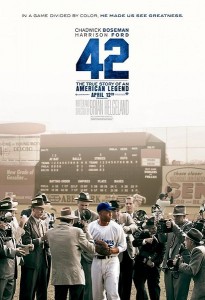42
Posted on April 11, 2013 at 12:08 pm
B+| Lowest Recommended Age: | Middle School |
| MPAA Rating: | Rated PG-13 for thematic elements including language |
| Profanity: | Racist epithets, crude and ugly insults, some additional strong language (s-words) |
| Alcohol/ Drugs: | Drinking, smoking |
| Violence/ Scariness: | Threats of violence, some scuffles, some injuries |
| Diversity Issues: | A theme of the movie, brief homophobic humor |
| Date Released to Theaters: | April 12, 2013 |
| Date Released to DVD: | July 15, 2013 |
| Amazon.com ASIN: | B009NNM9OA |
 Jackie Robinson was the first black man to play major league baseball. His number, 42, is worn by every player once a year to commemorate his achievements as a baseball player and as a man. This version of the story of the year the Brooklyn Dodgers broke the color barrier in baseball from writer/director Brian Helgeland is a little superficial, it still packs a lot of power, thanks to an evocative sense of its period and star-making performances by Chadwick Boseman as Robinson and Nichole Beharie as his wife. If what we see is a small part of the courage and integrity of this extraordinary man in taking on the virulent racism of his era, it is still enough to make this movie deeply moving.
Jackie Robinson was the first black man to play major league baseball. His number, 42, is worn by every player once a year to commemorate his achievements as a baseball player and as a man. This version of the story of the year the Brooklyn Dodgers broke the color barrier in baseball from writer/director Brian Helgeland is a little superficial, it still packs a lot of power, thanks to an evocative sense of its period and star-making performances by Chadwick Boseman as Robinson and Nichole Beharie as his wife. If what we see is a small part of the courage and integrity of this extraordinary man in taking on the virulent racism of his era, it is still enough to make this movie deeply moving.
It is just after the end of WWII. Black soliders returned home from fighting for freedom on behalf of a country that was still segregated, from the separate fighting divisions in the military to the “Whites Only” laws of the Jim Crow South. Brooklyn Dodgers manager Branch Rickey (a cigar-chomping Harrison Ford, in full growl) decides it is time to integrate baseball. He needs to find a player who is not only an athlete of unquestionable ability but someone who has the temperament to stay cool despite the constant attacks he will face from his own team, opposing teams, and the fans. Rickey decides that Roy Campanella was too sweet and Satchel Paige was too old (both would follow Robinson into the major leagues).
Rickey picked Robinson. He had the skill, he has played with white teammates in college, and he is tough. He was courtmartialed for refusing to go to the back of a military bus — and won. Rickey asks Robinson, “Can you control your temper?” “You want a player that doesn’t have the guts to fight back.” “I want a player who has the guts not to fight back.” Rickey knows that no matter what the provocation, any show of temper from Robinson will only give ammunition to the bigots. What would be called “spirit” in a white player will be called something different coming from him.
It is solidly entertaining, delivering all of the expected notes, and if it seems heavy-handed to anyone old enough to remember a time before the Montgomery bus boycott and the passage of the Civil Rights Act, it is perhaps understandable that Hollywood does not take for granted that younger audience members remember there was once a time when segregation was not only legal; it was the law. It harks back to the Sidney Poitier era of saintly black characters, which is understandable. But it is a movie about tolerance that cannot resist a homophobic joke about teammates showering together, which is not.
Parents should know that this movie features frank portrayals of bigoted behavior including a stream of racist invective, with crude insults. There are some sexual references, including adultery. Characters drink and smoke, and there are some scuffles and injuries.
Family discussion: Why was Jackie the best choice to be the first? How did he challenge the beliefs of his teammates? Read more about Jackie Robinson.
If you like this, try: “The Bingo Long Traveling All-Stars & Motor Kings,” Ken Burns’ “Baseball” series, “Brian’s Song,” and “A League of Their Own”
